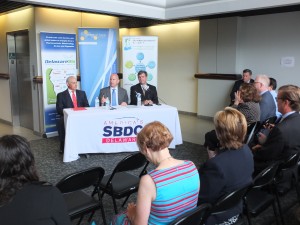New law supports research and development by small businesses
Wilmington, DE – Further cementing Delaware’s standing as one of the top two states in the “New Economy,” Governor Markell today signed legislation increasing opportunities for the state’s entrepreneurs to innovate and grow. The Governor was joined by business leaders and a bipartisan group of legislators at Delaware BioScience Association’s headquarters at Delaware Technology Park to sign House Bill 318, which doubles the state research and development tax credit for small businesses.

“We are encouraged that Delaware’s job growth has outpaced the nation’s for 17 months running, but we know we have more work to do and that the states and countries producing the research that leads to more innovation will have a clear economic advantage,” said Markell.
“State R&D tax credits have been proven to encourage additional research, attract companies from other states, and boost the high-tech sector. Yet only about two percent of our credits go to small companies and start-ups. That needs to change, and that’s what this law is all about. By encouraging research and development at all of our companies, we will incentivize innovation and growth in emerging industries that are vital to our economic future.”
The new law targets startups and small companies by directing additional support to businesses with less than $20 million in receipts. These entities would be eligible for a research and development tax credit of up to 100 percent of the corresponding federal credit, while large companies would continue to qualify for up to 50 percent.
Expanding the R&D tax credit for startups is only the latest in a series of efforts promoting innovation – an important theme from Markell’s State of the State address when he said, “Our ability to put Delawareans to work depends in part on whether we build on our legacy of innovation.” The Fiscal Year 2015 budget he signed at the beginning of the month includes $5 million for his proposals to support a Federal Research and Development Matching Grant Program and to fund the Delaware Cyber Initiative, which will help grow a key industry that has hundreds of unfilled jobs in the state.
HB 318, sponsored by Representative Bryon Short (D-Brandywine Hundred) and Senator Robert Venables (D-Laurel) with Republican co-sponsors in both chambers, will not cost the state additional revenue because the total amount of state funding for the tax credit would remain at $5 million.
“With the passage and signing of this bill we take another step in establishing Delaware as the best state to start and grow a business,” said Rep. Short. “By modernizing the R&D tax credit to better support the growth of small businesses, Delaware will be enhancing its competitiveness with other states and increasing the opportunity for job growth.”
“This increase in the research and development tax credit has the potential to create high quality jobs and to help Delaware small businesses, both of which the state needs badly,” said Sen. Venables. “It should help to improve the business climate both for existing businesses and as a way of attracting new ones.”
Previously, every business that conducted research and development in Delaware had calculated its credit in the same manner, whether the firm was a startup or a multinational. A company was given a share of the $5 million allocated for the tax credit – up to 50 percent of the federal tax credit they received – depending on the number of companies that applied in a given year. HB 318 ensures that small companies receive a larger share.

Studies have demonstrated the effectiveness of state tax credits for research and development, including in California and Illinois, where the policy has encouraged additional R&D activities, attracted companies from other states, and boosted the high-tech sector.
Among the attendees at today’s ceremony was Fred Kielhorn, CEO of DeNovix, a small instrumentation business in Wilmington that took advantage of the tax credit last year in its efforts to design, manufacture and sell laboratory equipment for today’s evolving life science technologies.
“This bill is extremely helpful for DeNovix,” Kielhorn said. “In these early stages cash is tight so every little bit helps. In part due to the state’s research and development tax credit, we were able to bring in the necessary resources early to enable us to quickly design, test and bring to market our first product, the DS-11 Spectrophotometer. I applaud Governor Markell for his business-friendly approach.”
In June, the Information Technology and Innovation Foundation (ITIF) recognized Delaware as the second best state in the New Economy, which is “marked by globalization, technological innovation and entrepreneurial development.” ITIF noted Delaware’s success in “high-wage traded services, foreign direct investment, and industry investment in R&D.”